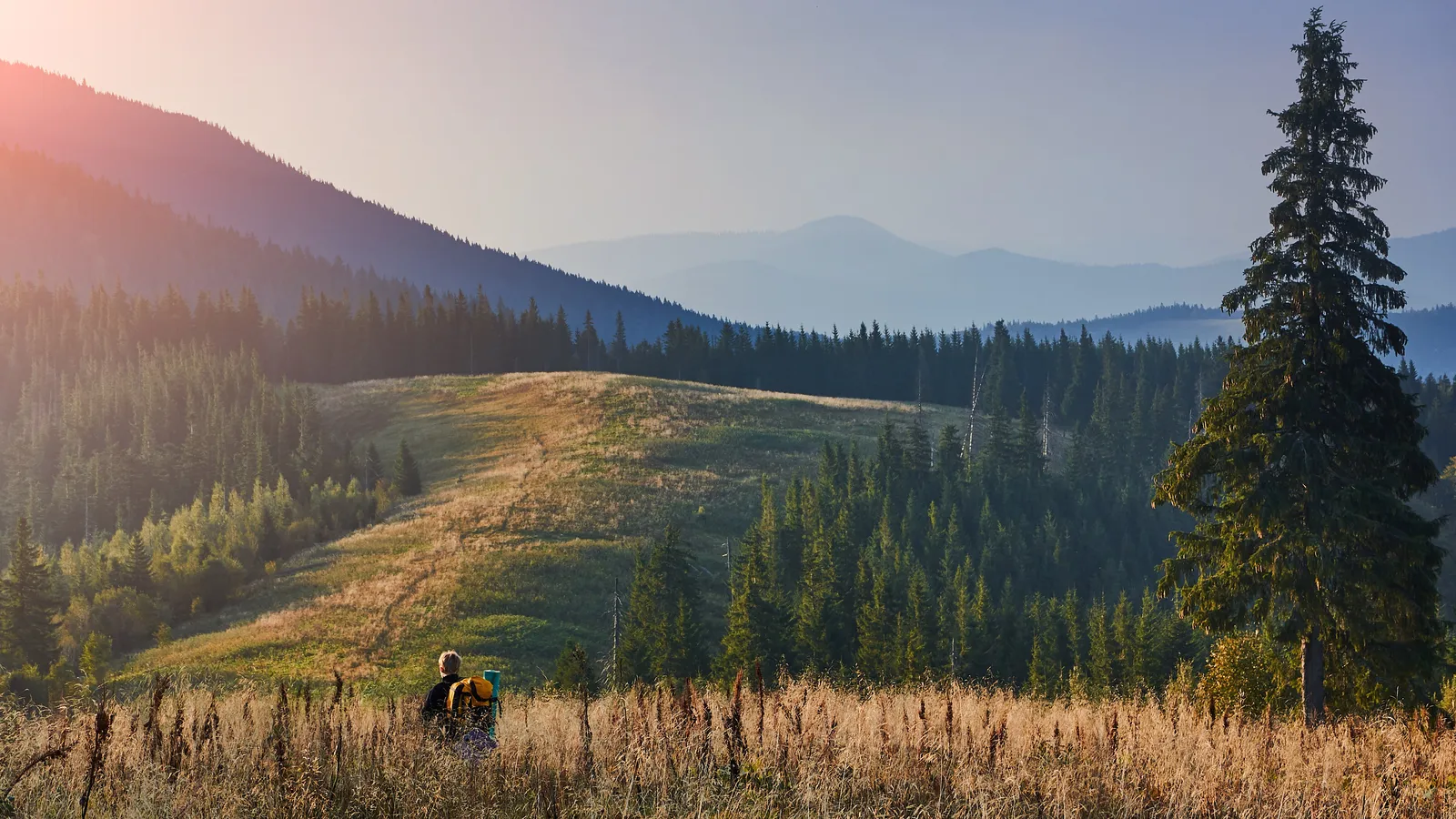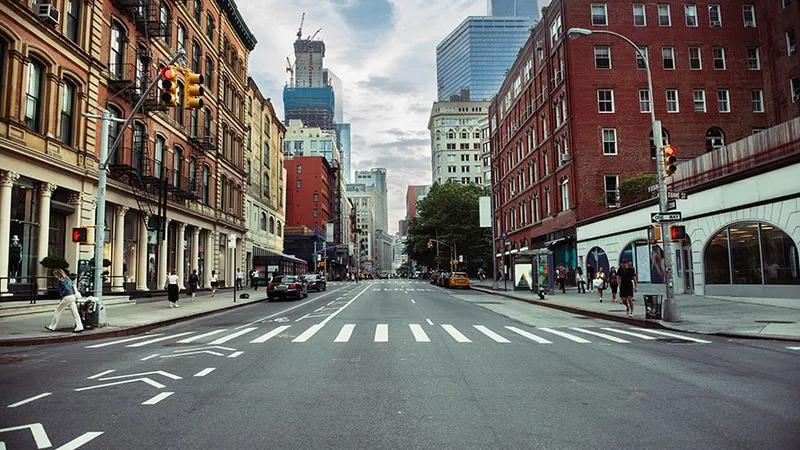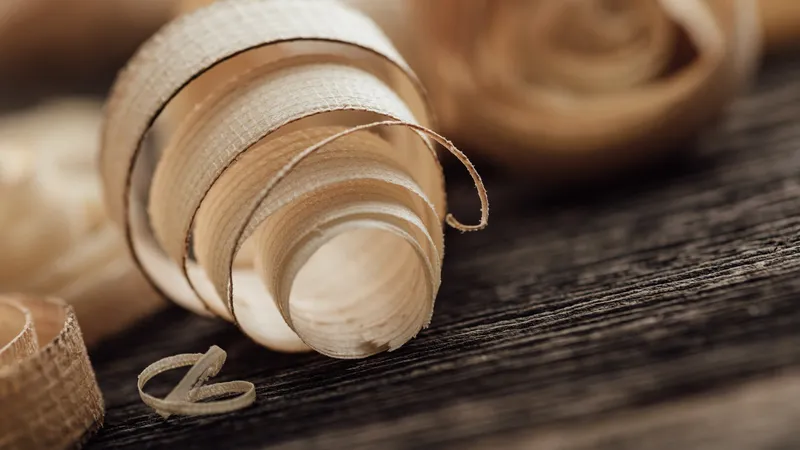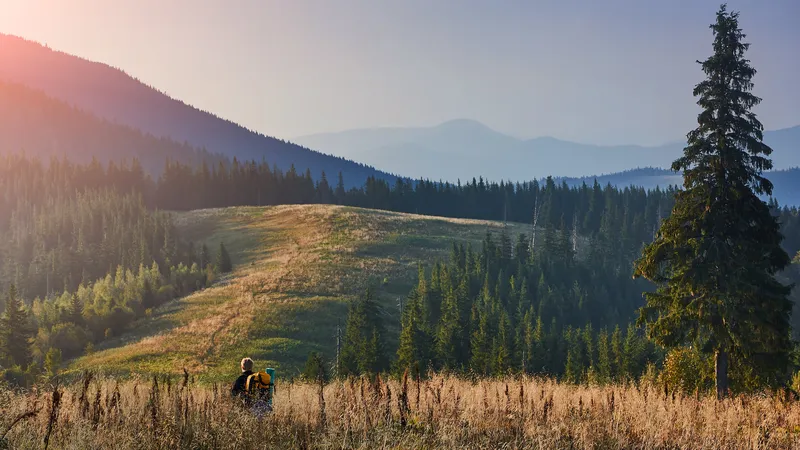Excerpted from A Stone's Throw: The Enduring Nature of Myth, by Ross Laird
The snow line is high in the alpine; lower down, the terrain is wet and dark. Two feet of snow fell in the valley last week, but the rains have laid the ground bare again, making this hike possible. My memory has preserved crucial landmarks – spiral of rock, trunk with a burl, sinew of mountain marked by old lava – that would have been covered by snow. I would not have wanted to delay the stone’s return until spring.
My father and I approach from the north this time, down the serpentine road. The overcast sky lightens in the east as we drive: first to sepia, then to citrine, then to the gull-wing gray that is the signature of November. My father remarks that the brightest part of the sky lies far ahead, directly above our destination. We drive the old highway, past a lone fisherman perched at the edge of a creek, through the canyon with its ramparts of sullen mist. I catch a fleeting glimpse of the roadside entrance to the cave we found when we stopped for a picnic thirty years ago. I remember my older brother leading me in, whispering about bears.
We turn off the highway and onto the gravel road, which climbs in a series of switchbacks upward. The forest – logged recently in spots, punctuated by ever-diminishing groves of old growth – is almost black beneath the canopy. I roll down the window to smell the rioting rot. The air is damp, clear, and replete with elusive scents. I can identify the smell of pine, and of wet soil, and perhaps salt from the coast nearby, but most of what’s here drifts by unrecognized. We climb higher, through stands of maple and birch. The wet maple leaves smell sweet, sugary. Moss covers most of the lower trunks. Beyond the crunch of gravel and the rhythm of the car’s engine, I hear a low, insistent ringing hum.
The road is greasy with rain and mud. We round a tight corner and ascend the final switchback. I feel hopeful about the day, but I’m already tired. My head feels foggy, my vision blurred, my forehead warm. It comes and goes: sometimes I feel fine – cool and relaxed – until suddenly my face flushes with heat and pressure, as though summer sun is bursting from within my head. I think about healing stones – of the Kem, of Abraham – and the stone that now lies in my pack, neatly nestled between a pair of jeans and three extra pairs of gloves. I think of the Tibetan pilgrimage during which stones are carried up a spiraling track to the peak of the mountain: as solace, as devotion, as healing prayer.
We park the car at the clearing, high above the valley floor. The air is crisp, the scent of recent snow still in the air. But there’s no trace of white on the slopes nearby. The wind must be coasting down from above, bringing with it the tang of alpine. We gather up our gear, shoulder our packs, take in the view west and south. My father pauses at the edge of the clearing, looking out over the ocean far below. I adjust the straps of my pack, which seems unreasonably heavy, and wait for him. He turns slightly to the side and points southeast, to where the peaks of Goat Ridge, Sky Pilot, and Mount Sheer slice the horizon with jagged peaks. He reminds me that we used to have our own names for those peaks: Bob, Ross, and Bruce, the three brothers. We made this landscape our own, my family and I.
I expect my father to shrug, laugh, and move toward the trail. But he does not. He looks back toward the sea again. I wait. He stands still in his brown sweater. Then he turns to me and says, in a voice softer than I’m accustomed to, “This is our country.”
We start down the trail, remembering the alder and bracken and speckled leaves. My pack digs into my collarbone – I’ve shaved roughly twenty pounds from the stone, but its weight is still considerable. My legs feel jittery. At the first turn in the trail, where we leave behind every sign of human presence, a farrago of multicolored leaves lie strewn across the path. Their vibrancy is startling in this season of encroaching gray: ripe papaya, Chinese porcelain. I notice leaves the color of dried papyrus, thin and dark with moisture marks. I reach down and feel their texture: smooth, webbed with patterned lines, uniform on one side and punctuated by ridges on the other. I pick up a leaf with edges like apricot and a glowing center as deep as the ripe plums of late summer. Near the tip, a neat, oblong hole has been made by some passing insect.
Here, on the forest floor dying away into winter, a second spring of fallen leaves illuminates the landscape. I find all the colors of the tropics: vermilion, maroon, indigo. A slash of russet runs through a leaf bright as mango. I see long, tapered leaves like kris knives; others are almost round, their edges serrated and rough. Along the fringe of an oblong leaf, edge bristling with tiny spikes, I discover an emerald band. It follows the curving contour of the leaf, bright against the pomegranate skin. I step over a root of birch and find a green leaf, almost a foot long, lying face up on the ground. I pick it up; the underside is the color of raw silk. Water drips from the graceful tip. Where the drops splash on the ground, I see a leaf rolled tight, its hide the color of binding on old books. All around: such books, such a library.
We’ve been on the trail about twenty minutes when I hear something, below and to my left: a rustle among branches, but without the crackle of twigs under foot or hoof. It’s as though something is moving through the air, brushing against the trees above the ground. I look toward the sound reflexively. Nothing. I raise my hand; behind me, my father stops. I scan the hillside below, straining to focus. A high-pitched whistle migrates through my ears. I turn my head to the side for a moment, reaching for the forest sound. But it’s gone. My father hasn’t heard anything. Perhaps, he suggests, it was an echo of our own passage.
I settle into the rhythm of my walk. And though my body jangles with weakness, still unaccustomed to exertion after the months of illness, I brim with enthusiasm. I have rehearsed the route back to the river hundreds of times in my head so that when we returned, exactly one year later, on Remembrance Day, I’d be certain of the way. I have walked this path in dreams and in reveries, I have noted its landmarks along other roads and tracks. The turns of this labyrinthine terrain have spread out to compass all my other journeys. The primal crossroads is here; I walk a straight line toward the center. It is not possible to take a wrong turn.
We take a wrong turn. Where two trails meet – one ascends toward the alpine, the other meanders into the valley – we take the lower path. I know, with certainty, the way we have to go: up, along the steeper trail with the overhanging scrim of branches. To the hidden intersection we found last year. But whether because of illness, distraction, or some presence ghosting through the trees, we bypass the path. We press on, not noticing. Yet something seems not quite right. It begins as a hesitation in my walk, a creeping fatigue which I first attribute to my poor health. Then I become confused, juggling the map in my head, trying to make the parts fit together. There must be a junction in the trail ahead, at which the finger of a small trail leads off toward the river. But how can that be? The secondary trail would be too far down, or else my reckoning is wide of the mark. These ruminations, any one of which would, normally, stop me in my tracks, simply roll around inside, untethered, abstract. The likelihood that I am placing us in considerable danger with such foggy thinking does not occur to me. My feet have been placed on the path, and I walk.
We pass small stands of devil’s club, sable stalks bristling. As I push one aside, some of the spines rake against my right hand. A slight stinging sensation warms up the crest of my thumb. A little farther on, orange fungi – wide and flat, edges chewed by tiny predators – lie nestled like misshapen pancakes in the grass. I hear water trickling nearby. The trail narrows between rows of young, wind-fallen trees, their slender trunks crossing the trail like intermittent hurdles. We step onto and over the lowest of them, pushing the branches toward the ground. The larger trunks block the trail at waist height; we snake beneath them. My pack gets caught.
On the other side of a rise tinged with the red of rotting cedar, we come suddenly upon the river. The foreshore bank is steep. Clinging to creepers and exposed roots, we scramble down to the water’s edge. In a gravel clearing made by spring wash, we collect ourselves and assess our progress. Out of the closeness of the forest, my head begins to clear. Aren’t we going the wrong way? I look upstream, to where white water rushes across red boulders and dark shapes. No, this is right: we climbed up from here last year, following the contour of the far bank. This time, without ice and frost, we can go straight up the river gorge. It will be wet, but fast.
I hop across to a midstream boulder. The surrounding water is loud and frothy. I stand there, poised to make a second, longer leap. My father looks tentative, but follows. I crouch, take a breath, and jump. Water droplets splash my face. I come down on a slanted spur of rock. My shoes slip, skitter, then come to rest. My left foot, which must have brushed the water, is wet. I smell the fresh and damp air, feel the swag and wamble of the boulder beneath me, and suddenly wake up.
What are we doing? We took a wrong turn, way back, and now we’re clambering up slick boulders in a rushing river. In running shoes, in cold weather. I’m weak, my father is seventy, and we’re climbing a river gorge. I’m not sure how this has happened, but we’ve forgotten about the shortcut, about the jog in the old road. All the discoveries of our last trip seem to have vanished. Here we are in precarious straits once again.
I pause, breathing chill air suffused with water that has sluiced through falls and a cave high above. I ease myself away from the somnambulism that started with the sound – brushing leaves, a whisper of passage – and has brought us far from our destination. I turn toward the bank, hop across to an onshore boulder, and step onto the bank. My shoes sink into the wet sediment. My father waits, face flushed with exertion. Let’s go back, I tell him, back along the trail to where the junction lies. We’ve come the wrong way. He’s relieved, as am I, that we won’t be trying to climb the river. And he shares my confusion: how is it that we so thoroughly misled ourselves? Perhaps this place is a labyrinth, and one must be guided by whatever forces govern the terrain. Permission to pass is given, or not.
We track backward, as we did on our previous trip. Then, we also made it to the river – though higher up – before turning back. Detours seem to be necessary here. Small white pebbles and fragments of cedar have been churned up by our passing. We follow these bread crumbs up the bank, along the crest, down again into the forest. I breathe easier.
The day warms, though a faint rain has begun to fall. I wonder about forgetting, and diversion, and necessity. Time passes quickly, and we come upon the junction sooner than I would have thought. We turn onto the ascending trail – my father ahead, my memory replaying his dwindling departure last year – and climb toward the sky.
I don’t get far before the heat begins: first in my brow, then down through my body like a red tide. My skin grows hot, and sweat runs off me. I stop to strip off my coat and sweater, continue on in a light shirt. This concerns me: it’s far too cold to be running around without insulation. But this sweat is not simply the water of exertion: even in extreme conditions, even in a sauna, I have not sweated this much. No, this is a fevered bath, my own river of fire. I take a deep swig from my water bottle and struggle on. But a dozen steps farther, as I shinny beneath an overhanging branch, my strength leaves me. I stumble. My knees dig into the cold ground. I steady myself against the branch, brush the sweat from my eyes, and take a deep breath. My father is now far ahead, hands in pockets, upright and stalwart.
I place my right foot on the ground, push with both hands against my knee, and try to hoist myself. It takes three tries. I stand, as the alpine wind presses my shirt onto my skin. I’m as wet as if I’d been thrown into the river. The straps of my pack chafe against my skin. One step. Two, three. An aggregated skein of rock from the volcano snakes across the path; I try to navigate across it without falling. I lean forward, drawing the weight of the pack over my lower back. Since we turned at the junction, the stone has been getting heavier. I reach behind me, to feel its contours. As I do so, I have the sensation of being pushed forward. The stone possesses its own mounting momentum, stronger as we edge closer to its home.
Up ahead, where the trail turns out of sight, my father waits for me. Just beyond, last year’s forgotten road meanders off the side of the main trail. We’re back on track. The incline eases somewhat, which heartens me. But I am weary beyond measure, as though the travails of the chicken pox and my subsequent fatigue have been compressed into a single morning. Heat and fire and the urge to collapse. But there is no going back. The tales of the old gods, the chronicle of my ancestors – these have taught me at least this much: the way lies through the fire.
We find the river again and cross it. Now we are high on the mountain, just below the alpine. The air is chill and sweet. We climb the far bank, fifteen or twenty feet up to where gangly branches offer up their last few blueberries. The soil of the bank is steep and loose. Does the river rise this high in spring? If so, the roar of the waters – which, even now, clamor through this cleft like a storm – would be loud as thunder.
As I mull over spring runoff and winter ice, I notice depressions in the soil of the bank. Some are our footprints, but others, clearly, are made by – what? Bears, beavers, other travelers? I can’t imagine other people traipsing through here, but I suppose the bear we ran into last year might frequent this stretch. After all, cliffs and tangles enclose the river as far up and as far down as I can see. This is the only open spot. There’s a small gravel clearing and good visibility to either bank. And the bear’s den is not more than fifty yards from here. The bears have turned in early this year, which usually means they sense a long winter.
We crest the far bank and cross again into the shadows of the forest. Every year, lost hikers disappear in this landscape. Errant cars, driven off the shoulder of the highway below, simply vanish. A while back, hundreds of searchers – on foot and in the air – failed to find a vehicle known to have left the road at a more or less precise location. The following summer, hikers found the car (and its unlucky driver) shielded by trees and undergrowth, a few feet from the roadside. This country, wild and inhospitable, unnerves me with its savagery. I feel even more vulnerable now; on fire, soaked in sweat, shaky as hell. Who could survive out here? If we were stranded, the blueberries would last about fifteen minutes. What then?
On two pages, folded twice, inside the front cover of my inherited copy of Flora of Southern British Columbia, in her careless handwriting, my great-aunt kindly provides the following:
Edible Plants found at Moderately High Elevation
Wild onions: bulbs may be eaten raw or cooked in hot ashes [with note to page 86, where I find pressed flowers]
Bitterroot: white root is bitter when eaten raw. Palatable when cooked.
Mariposa tulip: should be roasted in hot ashes.
Biscuit root: tubers may be eaten raw like celery, or the ends may be removed and the inner portion dried and pulverized to form a flour. Mix with water and bake.
The fallen trunks are not slick with frost this year. They’re wet, but manageable. We climb along them, scrabbling for balance, reaching for handholds in the underbrush. It’s not far now: along the bank, past the narrow gorge, beyond the bear den. Anticipation rises in me, counterbalances my exhaustion. Up ahead, hidden by a final rampart of hemlock, spruce, and cedar, I hear the waterfall. Last time, when the river was slowed by ice, the water sounds were muted. Now its full throat is open, and already I feel droplets of mist on my face. I look across the slope, north to where the sky is clearing. The high peak, skirted by a glacier, is bare to the wind. A straggling fleck of cloud falls away from its dark summit. Far off, where the horizon is a monolith of gray, I see the first tendrils of a winter storm. It will be here in four or five hours. By tomorrow, there will be a foot of snow where I’m standing, and all the gates of this place will be closed until spring.
We stay near the river, navigating by its sound, far enough from its edge that we don’t tumble into the gorge. We’re never more than twenty feet from the bank, but most of the time we can’t see the water: the forest is too dense. When I imagine we’ve come high enough, we turn right and down, crossing a patch of devil’s club. A rotten stump, perched on the steep incline, shows a tangle of roots sprawled in the eroded soil. Beyond it, two firs lean away from each other. Between them, in the near distance, I see a stretch of cliff. Black rock, textured with streaks of gray. And a bright summit, veiled by the topmost branches of lone and giant sentinels.
Where the slope of the riverbed eases, and the trunks of fallen and inverted trees offer many handholds, we make our way down to the water’s edge. The waterfall, many times louder and more forceful without the scrim of ice we encountered last year, rushes through the cave of boulders. Inside, stones on the floor are washed by clear mountain water. Their colors – alabaster, beetroot, terra-cotta, graphite – reflect across the walls of crushed obsidian, as though the old volcanic fire still burns in lenses of black glass.
White water jostles at the rear of the cave, snakes through a fissure of light from the river behind. This is where we go, up and around, to the place of beginnings. The pool is there. Ripples coast across its surface. I see the stone I struck with my hammer. I follow the imaginary line of the cracking ice with my eye. There, at the back of the pool, is a dark cleft. A boulder of aggregated obsidian, skewed and leaning, hangs over the spot. Last year, when snow covered every surface, the boulder blended into the terrain, looked like another snowdrift hovering above the waters. Now I can see its root, sunk deep into the riverbed, and its rough black hide. It is a mouth, yawned open. The pool slides down the well of its fathomless throat. A delicate sprig of frost, built up from mist flowing and freezing along the shore, lies just above the water’s edge.
I unshoulder my pack and place it on the wet ground. I unzip it, push aside spare gloves and the pair of jeans, and reach for the stone. It feels immensely heavy. I draw it out and take two steps to the pool’s edge. Behind, to my left, my father waits. I can see that the boulder, cantilevered up from the riverbed, leaning out over the pool, will eventually topple forward into the water. This stone that I have worked, that beckoned in dreams, will be buried in waters of black fire. It will find solace in the waters. It will be lost, and found again by its homecoming. Stones, said Pythagoras, are frozen music. Perhaps it will sing, and I will hear its song, far off, carried on the wind.
Before I can spin the moment out with ritual, the stone moves in my arms, as though of its own volition. It pulls me forward with its momentum, leads my hands out over the waters, and I let it go. It falls through the damp air: turning, the face rising. It descends with a sploosh of frothy water. The view clears, and I see the stone far down, in the deepest water. It lies in shadow, contours blurred by the passing river. Just another lump of rock.
I take a long last look, then turn back to my father. Behind him, the forest climbs toward the volcano. I look downstream, past the cave and the waterfall, to where the river sprints around a bottleneck of stones. The air is cooling quickly as the storm front approaches.
The heat is gone from me. For the first time in months, I feel well. Tired, but exuberantly well. My father has a dab of blood on his trousers from our scramble up the steep bank. My shoulders ache from the weight of the stone. We stand at the threshold of the sky – in looming darkness, surrounded by fire. We feel an insistent, inevitable pull. And we begin our journey home.



